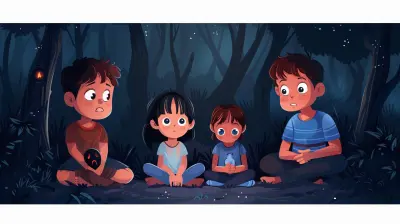The Complex Emotions of Losing Someone Suddenly
9 October 2025
The sudden loss of a loved one is like a punch in the gut — one minute, you're going about your day, and the next, your world turns upside down. Time seems to stop, and you're left grappling with a whirlwind of emotions that you may have never experienced before. It's confusing, heart-wrenching, and often leaves you feeling lost.
Grief is already complicated enough, but when it's unexpected, the emotional toll can be even more overwhelming. It's like being on a rollercoaster that you never signed up for. And the worst part? There's no guidebook on how to handle it.
In this article, we will dive deep into the complex emotions of losing someone suddenly, unpack why it feels so different from other kinds of losses, and explore helpful ways to cope.

The Initial Shock: "This Can't Be Real"
When you hear the news of someone's sudden passing, the first reaction is often shock. It's almost as if your brain refuses to believe it. You might say things like "This can't be happening" or "I just saw them yesterday." This initial disbelief is a natural defense mechanism. Your brain is trying to protect you from the intense pain that lies ahead.Shock is your mind's way of saying, "Hold on, I need a minute to process this."
Numbness: The Emotional Freezer
Following the disbelief, many people experience a sense of numbness. It's like a protective barrier goes up, freezing all your emotions so you can handle the immediate aftermath. You may feel like you're going through the motions — making funeral arrangements, contacting family members — but not truly "feeling" anything. This is your body's way of keeping you functional in the short term.However, this numbness doesn't last forever. Eventually, the freezer door opens, and when it does, all those locked-up emotions come rushing out.

The Wave of Emotions: Grief, Anger, and Everything In Between
Once the initial shock wears off, the emotional floodgates open. This is when the full gravity of the situation starts to hit. And let me tell you, it hits hard. Grief isn't linear; it comes in waves, and each wave can bring something different. One moment, you might feel overwhelming sadness, and the next, you could be consumed by anger or guilt.Grief: The Dark Cloud
Grief is the primary emotion everyone associates with loss. It's the deep sadness that comes when you realize that the person you loved is truly gone. And it's not just sadness for yourself — it's also sadness for the life they won't get to live. You mourn the future memories you won't get to share with them, the milestones they won't be there for, and the moments of joy that will now feel incomplete.Grief can feel like a constant dark cloud hanging over you, following you everywhere you go. It saps your energy, makes it hard to concentrate, and sometimes even makes it difficult to get out of bed in the morning.
Anger: The Uninvited Guest
Then comes anger, an emotion that often catches people off guard. You might wonder why you're feeling angry when you're supposed to be grieving. But anger is a natural part of the process, especially when the loss is sudden. You might feel angry at the universe, at the circumstances of their death, or even at the person who passed away for leaving you behind. It's not rational, but grief rarely is.Anger can also come from a feeling of helplessness. When someone dies suddenly, you have no control over the situation, and that lack of control can be infuriating. You might find yourself asking, "Why did this happen? Why now? Why them?"
Guilt: "I Should Have Done More"
Guilt is another emotion that tends to accompany sudden loss. You might replay your last conversation with that person over and over in your head, wondering if you could have said or done something differently. You wonder if there was something you missed, some warning sign that could have prevented their death. These "what ifs" can consume you, making it hard to move forward.But here's the thing: no matter how much you analyze the situation, you can't change the past. Guilt is an inevitable part of grieving, but it's important to remind yourself that you did the best you could with what you knew at the time.

Why Sudden Loss Feels Different
So, why does losing someone suddenly feel so much different from other kinds of losses? It's not just the element of surprise — it's also the fact that you had no time to prepare. When someone passes away after a long illness, for example, you're often given time to mentally and emotionally prepare for the end. You can say your goodbyes, make peace with the inevitable, and start to process your grief even before they pass.Sudden loss doesn't give you that luxury. It rips the rug out from under you, leaving you with unfinished business and unsaid words. You don't get to say goodbye. And that lack of closure can make the grieving process feel even more difficult.
The Lack of Closure
Closure is something we all crave when it comes to loss. It gives us a sense of finality, a chance to say our goodbyes and start the healing process. But when someone is taken from us without warning, closure feels impossible. You may find yourself stuck in a loop, constantly thinking about what you didn’t get to say or do.This lack of closure can extend the grieving process, making it harder to move on. It's like trying to finish a book when the final chapter is missing — you're left wondering how it all ends, and that uncertainty can be incredibly painful.
The Trauma of the Unexpected
Sudden loss also brings an element of trauma. When death is unexpected, especially if it was the result of an accident or some other tragic event, it can leave you with emotional scars that take much longer to heal. The trauma of how the person died can sometimes overshadow the grief of losing them, making it difficult to process your emotions.In some cases, people who experience sudden loss may develop symptoms of PTSD (Post-Traumatic Stress Disorder), especially if they were present at the time of the death or were the first to receive the devastating news. Flashbacks, nightmares, and severe anxiety are not uncommon.

Coping With Sudden Loss: What Can You Do?
So, how do you cope with the sudden loss of a loved one? There's no one-size-fits-all answer, but there are steps you can take to help navigate the emotional storm.1. Allow Yourself to Feel
First and foremost, let yourself feel whatever comes up. You might be tempted to push your emotions aside or numb yourself to the pain, but that will only prolong the healing process. Whether it's anger, sadness, guilt, or confusion — it’s important to acknowledge and accept your emotions. Grief is messy, and that's okay.2. Lean on Your Support System
You don't have to go through this alone. Turn to your friends, family, or a support group to help you navigate the tough days. Sometimes, just talking about your feelings with someone who understands can provide some relief. And if you feel like you're drowning in grief, consider talking to a therapist. Professional help can guide you through the maze of emotions you're experiencing.3. Take It Day by Day
Grieving is a marathon, not a sprint. Take it one day at a time, and give yourself permission to move at your own pace. Some days will feel harder than others, and that's okay. Healing from a sudden loss is a long process, and there’s no timeline for when you "should" start feeling better.4. Create Your Own Closure
If you're struggling with the lack of closure, consider finding ways to create your own. Write a letter to the person you lost, telling them everything you wish you could have said. Hold a private ceremony or come up with a ritual that helps you say goodbye on your own terms. Closure looks different for everyone, and sometimes, you have to create it for yourself.5. Honor Their Memory
One of the best ways to cope with loss is to find ways to honor the memory of the person who passed. Maybe that means planting a tree in their name, donating to a charity they cared about, or simply sharing stories about them with others. Keeping their memory alive can bring a sense of comfort and help you feel connected to them even after they're gone.Conclusion: Grief Is Personal, But You’re Not Alone
Losing someone suddenly is one of the hardest things anyone can go through. It brings with it a whirlwind of emotions — shock, grief, anger, guilt — that can leave you feeling lost and overwhelmed. But remember, you don’t have to go through this alone. Lean on your support system, take it day by day, and allow yourself to feel whatever comes up.Grief may be a personal journey, but it's also a shared human experience. And while the pain of losing someone will never completely go away, with time and support, you will learn how to carry it.
all images in this post were generated using AI tools
Category:
Grief And LossAuthor:

Eliana Burton
Discussion
rate this article
1 comments
Rhea Allen
Losing someone suddenly feels like getting hit by a bus you didn't see coming—emotional whiplash is real! It's okay to laugh at the absurdity of it all sometimes. Just remember, healing is like a DIY project: messy but totally worth it!
October 18, 2025 at 4:57 AM

Eliana Burton
Absolutely, the unexpected nature of loss can be overwhelming, and finding humor in the absurdity can be a vital part of the healing process. Embracing the messiness is essential on this journey. Thank you for sharing!


